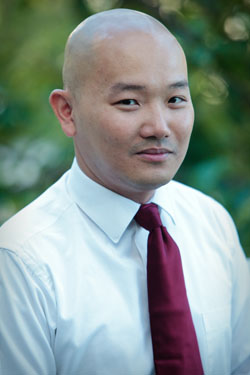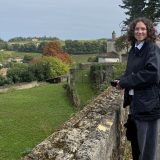Wilkinson Professor Receives Largest Award Recorded for the College
September 30, 2013

Chapman University
Assistant Professor Kerk Kee
, in the
Department of Communication Studies
(in
Wilkinson College of Humanities and Social Sciences
) has received a grant from the National Science Foundation (NSF). The amount is $324,981 making it the largest award received in Wilkinson from NSF or any other sponsor.
Professor Kee, who teaches organizational communication; communication and workplace technologies; and communication and virtual organizing, is a self-proclaimed liker of all things “digital.” Professor Kee’s work centers on the organizational dimensions of technology and how technologies are changing the way we work, interact with people; and the way we function and live in society today.
The grant is under NSF’s Division of Advanced CyberInfrastructure, Directorate for Computer & Information Science & Engineering, in a cross-cutting program called “Virtual Organizations as Sociotechnical Systems (VOSS)”. Therefore, Kee’s interdisciplinary project sits at intersection of computational sciences and social sciences.
This project looks at how scientists develop and use custom-made technologies to do their scientific work – namely big data science. The challenge of big data science is that it requires new computational tools that are not commercially available and still need to be developed, and the tools need to be powered by supercomputers to process big data sets in science. This project looks at big data tool development by computational scientists and use by domain scientists (biologists, physicists etc.) who work in specific scientific fields. Some domain scientists will learn how to code and build their own computational tool but they also may reach out to computational scientists to help make a tool that can handle processing big data sets. The collaboration between computational scientists and domain scientists is complex and challenging.
EXAMPLE: Imagine a team of biologists from around the country (or world) who have sets of genomic data that they combine. But the combined data is so big that an office-based computer does not have sufficient computational power to process the data and no existing tool is available to process their combined big data set. So the group of biologists partner with computational scientists to develop a new tool that can be powered by supercomputers. This kind of interdisciplinary collaboration requires both partners to learn about each other’s field. Further, while in beta phase (prototype) the biologists and computational scientists go back and forth tweaking the tool – so the development of the technology and the use of the technology are simultaneous, which creates a case that is different from conventional studies of workplace technologies.
Traditionally, social studies of technologies in the workplace have looked at the
development
of the technology and the
use
of technology as separate processes. Technology development ends when technology use begins. Firms introduce new technology that was developed behind closed doors and tested and then mass produced and commercialized. Social scientists of technologies then focus on the effects of how new technologies are changing the way organizations do their work. The uniqueness of Kee’s NSF project is that it looks at technology development and use in an emerging phenomenon in big data science that departs from the traditional understanding of development and use technologies in the workplace. For example, we don’t call Microsoft and ask for tweaks. We are stuck with what Microsoft offers – so we change the way we work to adapt to Microsoft.
“In the groups that Kee’s project follows, scientists as users actually work with computational scientists as developers to custom make a tool and tweak it further for scientists to do big data science that otherwise impossible to conduct. But this kind of user-driven process is full of challenges.”
According to Kee, “Repeatedly scientists say technology based scientific groups in big data science fail not because of the technology but because of the social challenges in organizing (i.e., the people).”
The grant is 3 years and Dr. Kee is the sole PI. Students will be hired for this project – 3 undergrads from communication studies and a grad student from computational science resulting in an interdisciplinary team and collaboration between Wilkinson and Schmid.

